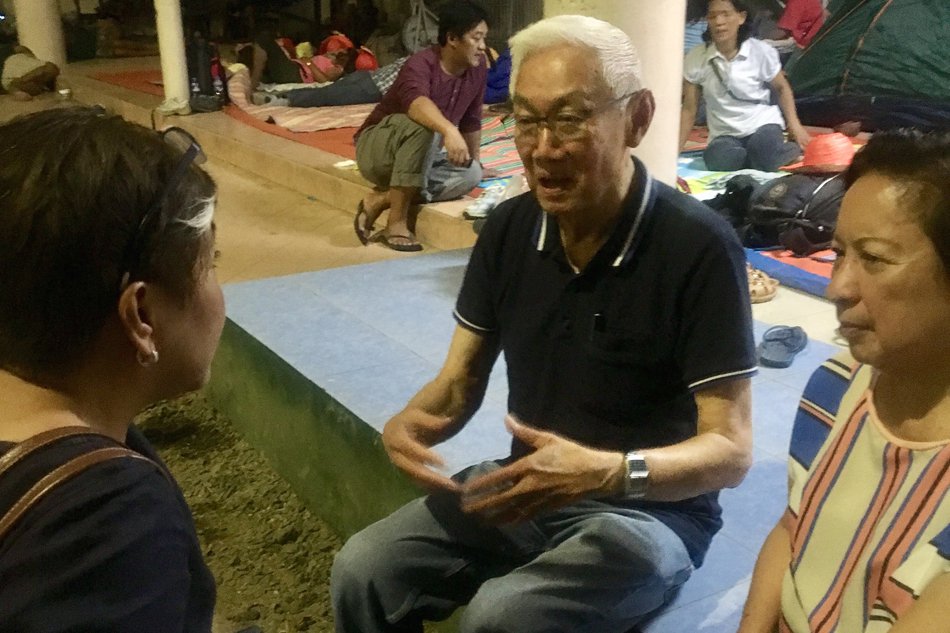Inday Espina Varona, ABS-CBN News
Posted at Oct 25 2017 08:59 AM
The senior peace adviser to the National Democratic Front peace panel urged President Rodrigo Duterte Tuesday night to drop “untenable” conditions for the resumption of peace talks.
“The NDF is willing to resume peace talks with any regime that seriously wants to resolve the roots of armed conflict,” Luis Jalandoni told ABS-CBN News.
“We have been informed of the possibilities, but have been told that it’s better to be quiet (on the details) for now,” the retired rebel peace panel chair said on the sidelines of a solidarity night for farmers at the Department of Agrarian Reform (DAR).
Last October 20, President Duterte hinted he is exploring the possible resumption of talks after months of threatening rebels and their supporters and accusing the militant Left of joining a conspiracy to unseat him from power.
But the President insists on a ceasefire between the Armed Forces and the New People’s Army (NPA) as negotiators hammer out an agreement on social and economic reforms.
“It’s not tenable,” Jalandoni warned.
“It’s clear to Duterte and to his advisers, and to (Labor Secretary and peace panel member Silvestre) Bello and the others. There cannot be such a thing as surrender, or a prolonged ceasefire without substantial inroads on basic social and economic issues. The NDF will never agree.”
Jalandoni stressed the NPA will not give up its arms.
The armed wing of the Communist Party of the Philippines (CPP), he added, will assert the right to protect its territories and surrounding communities from attacks by state forces.
CLASHES AFTER MARTIAL LAW
The government cancelled the fifth round of talks in May as rebels stepped up offensives with the declaration of Mindanao-wide martial law.
The Communist Party of the Philippines (CPP) issued the order after Defense Secretary Delfin Lorenzana included Asia’s oldest leftist insurgency as a target of martial law.
In July, Duterte warned he would abandon peace talks after a new spate of NPA actions and an exchange of rants with CPP founder Jose Ma. Sison. The President ordered around 20 NDF consultants released from detention for the talks to surrender or face arrest.
Since then clashes have erupted around the country, killing fighters from both sides, as well as civilians.
Thousands have also evacuated their homes due to military aerial bombardment.
In August, Duterte said any resumption of talks as a “waste of money.”
The President later warned that he was near to signing a formal termination notice, a required step in the conduct of negotiations.
Last week, however, Duterte acknowledged that talking to the New People’s Army (NPA) could help ease the country’s problems.
The President’s statement came a day after he met Presidential Adviser on the Peace Process Secretary Jesus Dureza and GRP chief negotiator the NDF Labor Secretary Silvestre Bello III. Both have refused to elaborate on Duterte’s remarks.
Jalandoni said the President’s change of heart could be linked to a series of national surveys showing grave concern over the killings in the drug war, a decline in the economy and discontent among the country’s poorest sectors.
IMPASSE
Despite the breakdown of talks, rebel and government negotiators have continued talking with the Norwegian government, the third-party mediator.
Norway announced Tuesday that it has appointed a new special envoy to the Philippine peace process.
Idun Tvedt, who replaces Elisabeth Slåttum, was a member of the facilitation team for peace process between the Colombian government and the Fuerzas Armadas Revolucionarias de Colombia or FARC.
Jalandoni told ABS-CBN News that finalizing the Comprehensive Agreement on Social and Economic Reforms (CASER) could build confidence and encourage the rebels’ mass base to consider a new ceasefire with clear safeguards for non-combatants.
Jalandoni also told farmers the best way to push peace talks is by strengthening campaigns that focus attention on grave issues.
“The fight at the grassroots [is] essential in pushing for meaningful peace talks,” he said in a short speech. “Your perseverance and courage give us inspiration. All of us take strength from you.”
Connie Ledesma, a member of the NDFP peace panel, pointed out that acceding to Duterte’s demands without substantial gains would mean “capitulation.”
The NPA and the Armed Forces have accused each other of breaking unilateral ceasefires.
Duterte rejects any rebel territorial claim and insists the AFP and the PNP have authority to maintain law and order anywhere in the country.
Jalandoni, however, said it would be unreasonable to expect the NPA to meekly accept AFP sweeps into guerrilla bases found in 71 provinces.
AFP Chief Eduardo Año, Defense Secretary Delfin Lorenzana and other military officers have been very vocal about plans to destroy the revolutionary movement, Jalandoni pointed out.
A few days before Duterte raised the possible resumption of peace talks, Año said the end of the four-month war in Marawi would allow the military to train its fire on the CPP-NPA.
In a speech before the Eastern Mindanao Command, Año said the AFP has recruited 300 indigenous fighters to fight against fellow Lumad believed to make up the bulk of the NPA in southern Philippines.
Año said the AFP also has 13,000 new members to meet the 2018 deadline to wipe out the rebellion that turns 50 next year.

